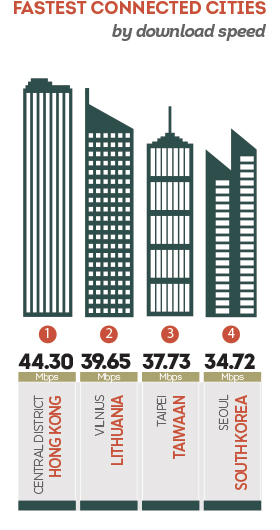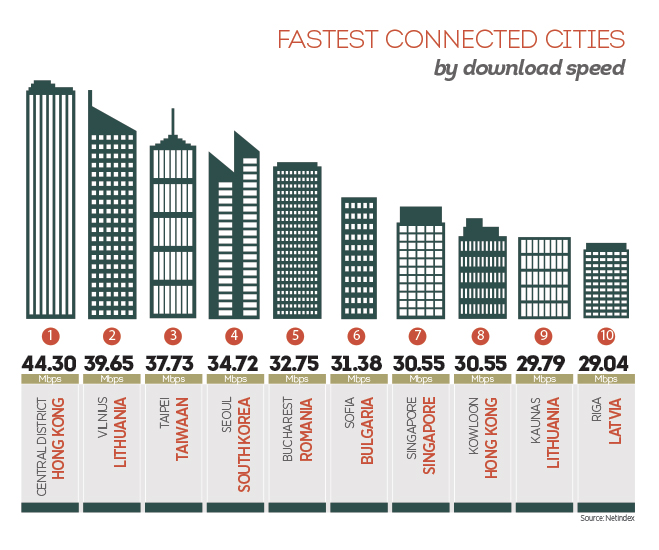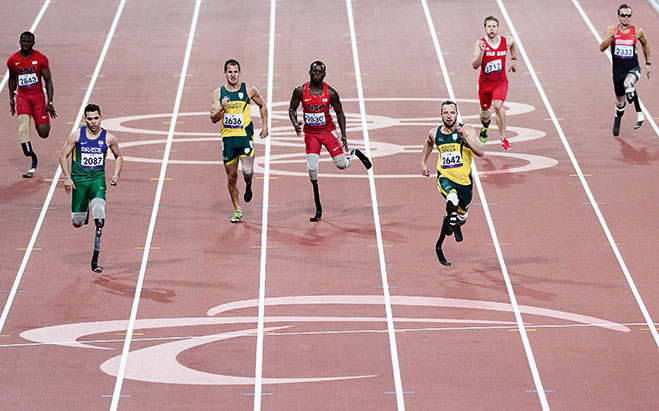Autumn Knowledge
Autumn snippets from around the globe

Internet hits record average
Akamai’s ‘State of the Internet’ study has found that average access speeds increased during the first quarter of 2012, as has penetration of internet services worldwide. The number of unique IP addresses connected to the Akamai Intelligence Platform rose by almost 14 percent last year. China, Brazil, Italy and Russia all registered strong growth.
125 countries in the report saw year-on-year speed increases, up to the new global average of 2.6Mbps. Only 10 countries saw a decrease in speed. South Korea can boast the fastest average speed at 15.7 Mbps, followed by Japan (10.9 Mbps), Hong Kong (9.3 Mbps), the Netherlands (8.8 Mbps) and Latvia (8.8 Mbps).
German officials demand Facebook destroys database
German Data Protection Officials in Hamburg have accused Facebook of illegally compiling photo databases of users without the needed consent and have insisted that Facebook destroy its archive of files relating to facial recognition technology.
Facebook uses analytic software to study usersí photos and prompt them to ìtagî their friends. The software has proven very controversial in Europe where EU data protection laws require that users specifically opt in to the service.
Facebook, instead, automatically assumes user consent and goes ahead with the creation of digital files based on the biometric data of their faces. The group has acknowledged that it is compiling biometric data on users, but claims it doesnít have to cease the practice because it is legal in Ireland where Facebookís European operations are based.
In discussions with the Irish Data Protection Commissioner, the company was advised to notify users of the photo tagging software ñ which it has done. However, the Hamburg regulators have the option of issuing a fine of up to Ä25,000 or attempting to sue Facebook, which would prove legally difficult, as its headquarters is located in the US.
This isnít the first time that Facebook has fallen foul of German users. Last year, the German government found the Facebookí ëLikeí button illegal as a personís web movement and preferences could also be tracked from using it.
Intelligent traffic lights aid hesitant motorists
There is a name for that split second when you arrive at an amber traffic light, and you have the decision of powering through and hoping you donít get broadsided by a truck, or waiting at the red light. Itís called the ëdilemma zoneí, a phrase coined by Dr. Denos Gazis in 1959.
Belgium-based company Traficon has unveiled new technology to help drivers through the dilemma zone. It combines a video sensor with radar that can control traffic lights, keeping it lit amber until you are safely through the crossroads or T-Junction. Traficon also showed off a similar system that utilises thermal cameras to detect and allow cyclists safely through junctions. These technologies aim to increase safety while reducing congestion and fuel usage.
Both technologies were unveiled at the 117th International Municipal Signal Association ñ an annual traffic light convention. These are just two examples of a number of intelligent transportation systems (ITS) that will contribute to safer and more fluid traffic systems.
Further improvements in ITS may see navigational systems that warn of heavy traffic, real-time parking information, fee-based express lanes, and road sensors that warn drivers of stalled vehicles ahead, as have already been implemented in Japan.
Cleaning brain halts virus
Researchers at the University of Rochester have discovered that a series of tubes, newly dubbed the ìglymphatic systemî, run alongside blood vessels. These tubes rapidly pump cerebrospinal fluid through them, carrying away waste accumulated in the blood vessels.
The glymphatic system, only now discovered by new imaging techniques known as two-photon microscopy, allowed the scientists to look inside the brains of living mice. By doing so they could see amyloid proteins, which are theorised to cause Alzheimerís disease, being carried away from the brain.
By ramping up the glymphatic systemís efficiency of purging waste from the brain, doctors may be able to reduce or prevent the onset of neurodegenerative diseases such as Alzheimerís or Parkinsonís. However, a cure for both diseases is still some way away.
Sports tech controversy
The London 2012 Paralympics saw a prime illustration of the contention surrounding technological advances in athletics after the menís T44 200m final.
Renowned South African sprinter Oscar Pistorius was beaten into second place by Brazilís Alan Oliveria, however Pistorius surprisingly voiced his discontent about the length of his rivalís running blades, stoking the long-running debate on the potential extent that technology can give competitors an undue advantage.
Oliveriaís height was increased from 177cm to 181cm in his new blades, which is legal within the International Paralympic Committee (IPC) rules. However, Pistorius competes at a height of 184cm despite being allowed to raise his height to 193cm.
Some sport scientists believe that the increased height for sprinters can effect stride length which usually makes them run faster. Yet, despite this, Pistorius actually look six fewer strides to Oliveiraís 98, with a higher average stride length.
The South African later apologised for his remarks, but it later emerged that Pistorius had expressed his concerns about the new raft of technology available for Paralympic athletes to the IPC prior to the 2012 Games.















